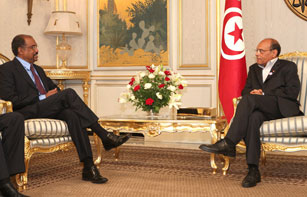
UNAIDS Executive Director Michel Sidibé met on 3 July with the President of Tunisia, Moncef Marzouki (right) and other high-level government officials.
Meeting on 2-3 July with top officials of Tunisia’s new tripartite coalition government, UNAIDS Executive Director Michel Sidibé praised the country’s leadership for its strong commitment to reducing stigma and discrimination—a key barrier to progress in HIV responses across the region.
While Tunisia has a relatively low HIV prevalence, at about 0.06% of the national population, evidence has shown pockets of high HIV prevalence among key populations, including injecting drug users, sex workers and men having sex with men. These populations often face stigma and discrimination which can hamper access to health services and nurture the HIV epidemic.
In his discussions with the President of the Republic, Moncef Marzouki, Head of Government, Hammadi Jebali, and Vice-President of the National Constituent Assembly, Meherzia Laabidi—three leaders who recently came to power in the country’s first democratic elections—Mr Sidibé noted that youth were the engine of the revolution that brought political change to Tunisia.
“Investing in young people and responding to their aspirations for a more just and equitable society will be critical to the future advancement of this country,” said Mr Sidibé. “Youth can play an important role in accelerating Tunisia’s response to HIV and other health challenges,” he added.
Increasing local production of HIV medicines
We need to recognize the existence of high-risk behaviours in our societies, such as injecting drug use, sex between men and commercial sex
Meherzia Laabidi, Vice-President of the National Constituent Assembly
Speaking with Mr Sidibé at the Presidential Palace on 3 July, President Marzouki expressed his strong commitment to strengthening the national HIV response. He said that Tunisia would strive to achieve the vision of “three zeroes”—zero new HIV infections, zero discrimination, zero AIDS-related deaths—and highlighted three priority areas for action: improving public health, ensuring human rights and addressing the socio-economic drivers of HIV.
The President noted that Tunisia could help reduce Africa’s dependency on external aid by producing antiretroviral medicines. He pledged to advocate for greater local production of medicines at the next meeting of the New Partnership for Africa’s Development (NEPAD) in Addis Ababa. Currently, a majority of drugs dispensed in Tunisia—and across the African continent—are imported.
Reducing dependency on external aid
In a meeting with Mr Sidibé later that day in La Kasbah Palace, Tunisia’s Head of Government echoed the President’s remarks on local drug production. “I support the idea of Tunisia producing antiretroviral medicines to reduce its dependency on external aid,” said Mr Jebali. “The production of antiretrovirals presents not just an economic opportunity, but also a humanitarian opportunity,” he added.
There was mutual agreement between Mr Jebali and Mr Sidibé that Tunisia should assume greater ownership of HIV prevention programmes that support key affected populations; currently, such programmes are funded exclusively through international sources.
Acknowledging high-risk behaviours
It is time for Tunisia to face the facts on HIV, said the country’s Vice-President, Meherzia Laabidi, in a separate meeting with Mr Sidibé at the Palace of the Assembly. “We must move beyond official political denial. Just closing our eyes won’t stop the fire,” she added.

UNAIDS Executive Director Michel Sidibé (left) with the Tunisian Head of Government, Hammadi Jebali.
In her discussions with Mr Sidibé, the Vice-President recognized that ensuring a socially inclusive society is the responsibility of political leaders. She said that neglecting key populations at high risk of HIV infection puts everyone in danger. “We need to recognize the existence of high-risk behaviours in our societies, such as injecting drug use, sex between men and commercial sex,” she said.
Noting that access to basic health services is a human right, Ms Laabidi underscored the importance of including the “right to health” in the new Tunisian constitution, currently under development.
During his two-day mission in Tunisia, the UNAIDS Executive Director met with several other government officials, including the Minister of Health, Dr Abdellatif El Mekki, and the Minister of Human Rights and Transitional Justice, Samir Dilou. He also engaged with people living with HIV, representatives from key affected communities and the United Nations country team.




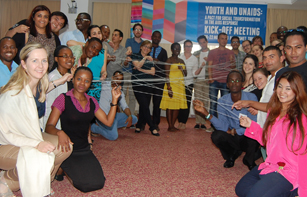
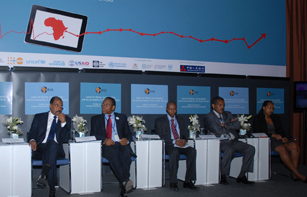



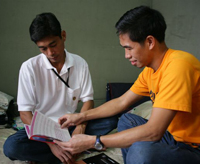 The concept of ‘positive prevention’ provides an opportunity to highlight the prevention needs of people who know their positive serostatus.
The concept of ‘positive prevention’ provides an opportunity to highlight the prevention needs of people who know their positive serostatus.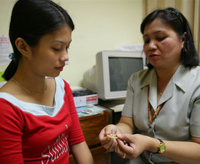 If the prevention needs of positive people are to be adequately addressed, people who know they are living with HIV must be involved in defining and developing programmes.
If the prevention needs of positive people are to be adequately addressed, people who know they are living with HIV must be involved in defining and developing programmes.